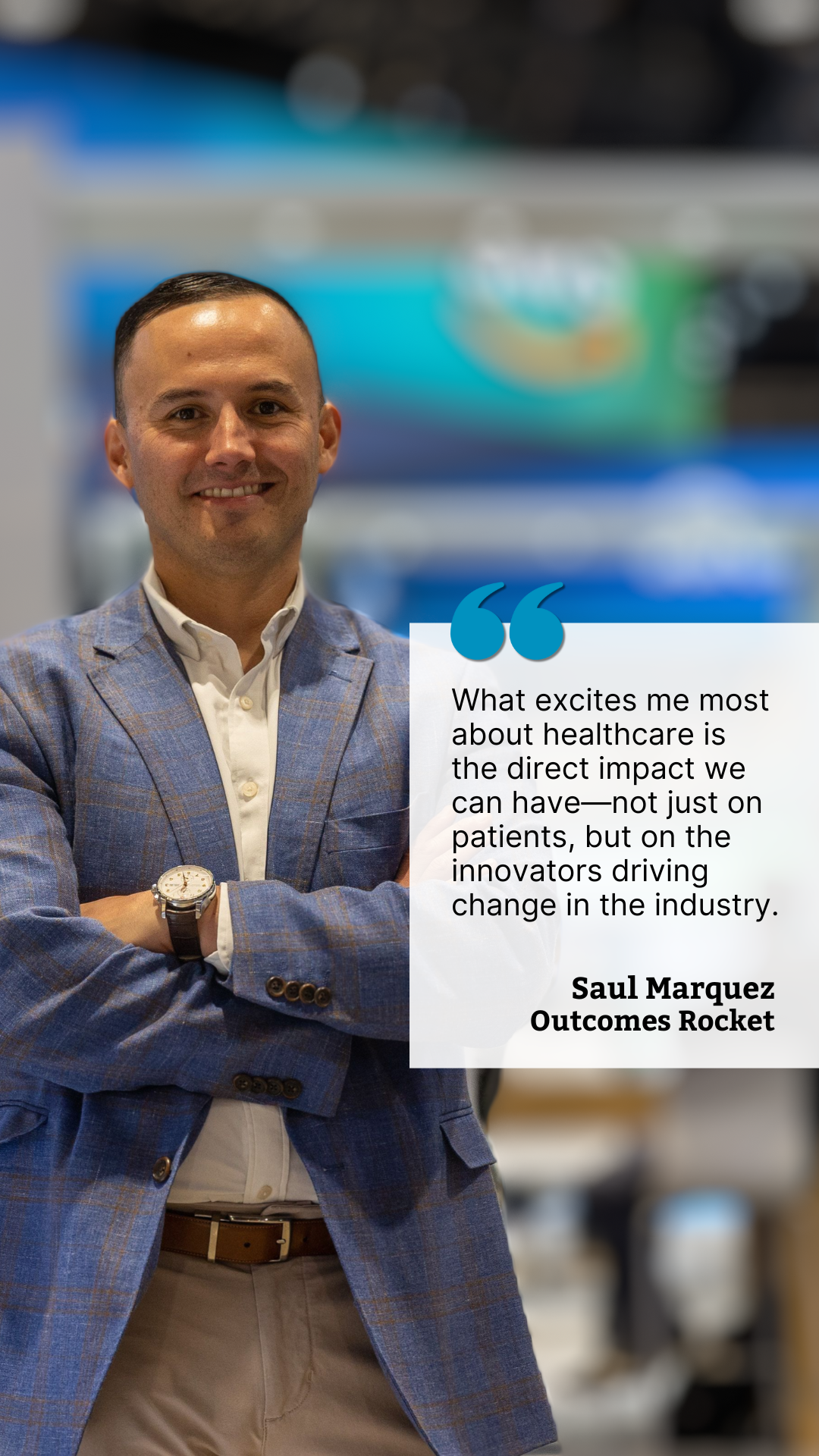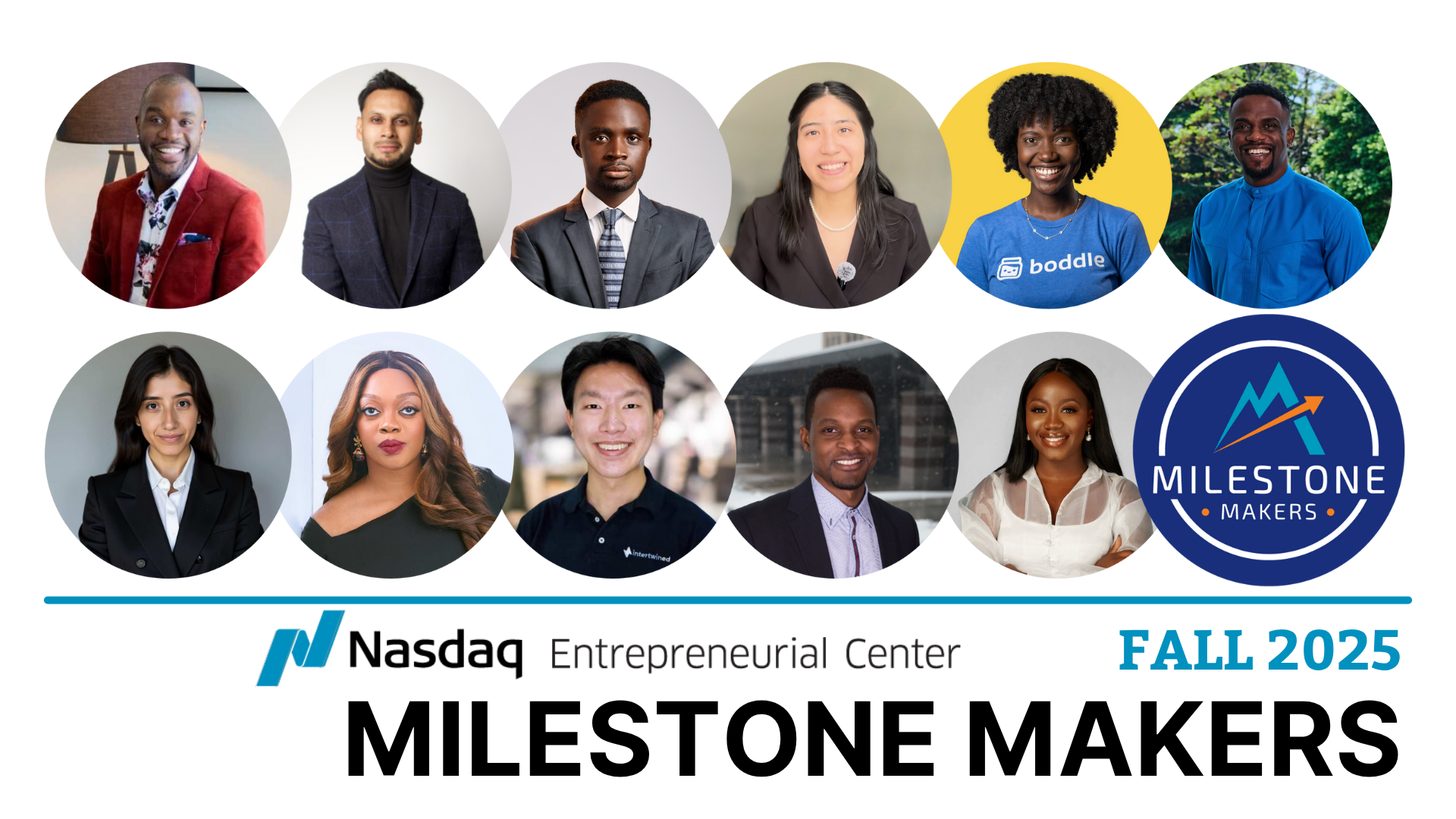Meet Saul Marquez: Healthcare Marketing Leader, Health Tech Entrepreneur, and Host of the Outcomes Rocket Podcast
If you’re looking for inspiration at the intersection of healthcare marketing, entrepreneurship, and digital health innovation, look no further than Saul Marquez. As the founder and CEO of Outcomes Rocket, a global agency specializing in health tech and med tech marketing, Saul helps healthcare companies accelerate growth, improve commercialization strategies, and expand their impact in a fast-changing industry.
With over 20 years of experience in healthcare sales and marketing—working with major players like Stryker, NuVasive, and Medtronic—Saul saw firsthand the challenges healthcare companies face when bringing new products and solutions to market. That insight sparked the creation of Outcomes Rocket, a consultancy dedicated to helping brands navigate the complex world of digital health commercialization and scale more effectively.
Saul is also the host of the widely acclaimed Outcomes Rocket Podcast, one of the top-rated healthcare podcasts, featuring over 1,900 interviews with health tech founders, hospital CEOs, and industry thought leaders. With a 4.8-star rating and daily episodes, the podcast serves as a valuable resource for professionals looking to stay ahead in the evolving healthcare landscape.
In this interview, Saul shares his entrepreneurial journey – from launching a small service business in college to building a mission-driven agency that’s redefining success in healthcare. He offers insight into the power of relationships, the importance of solving big problems, and how mentorship, mindset, and momentum have shaped his path.
Whether you’re a startup founder, a marketing leader in healthcare, or simply passionate about entrepreneurship in healthcare, Saul’s story is packed with practical advice, personal lessons, and a bold vision for the future of the industry.

What does “entrepreneurship” mean to you? How has your understanding of it evolved over time?
Saul Marquez: I studied French in college and understand that entrepreneurship comes from the French word meaning “to undertake” or “to take an adventure.” For me, entrepreneurship is all about undertaking projects that solve problems and help people get what they want. The bigger the project and the bigger the problem, the higher the reward.
That’s why I decided to work in the healthcare space, which represents 18% of the United States GDP – over $4 trillion a year. These are big problems to solve.
My understanding of entrepreneurship has evolved over time. Initially, I thought it was all about innovation. However, I’ve come to realize that while innovation can be a part of entrepreneurship, the core of successful entrepreneurship is solving tough problems quickly for the people and organizations that need them solved.
Tell us about your first experience with entrepreneurship. What sparked your interest in building something of your own?
SM: My first experience with entrepreneurship was a company I started in college called The Gutter Guys. It came at the tail end of an internship where I was doing sales for a roofing company. I had a ladder and learned how to climb onto roofs, and while I was up there, I noticed that people’s gutters were often really dirty. Cleaning them was a task that was frequently ignored, even though it needed to be done.
Since I knew how to do it, I started knocking on doors and offering a gutter cleaning service to make extra money in college. It brought in some cash, but it wasn’t something I felt truly inspired by or excited to wake up and do every day. However, it did spark my interest in entrepreneurship – realizing that I could create value for people by solving problems and getting things done.
What is the origin story of your company? What motivated you to start, and how did those early days shape your journey?
SM: The origin story of Outcomes Rocket starts with a podcast. My goal with the podcast was to solve a personal problem: I wanted to meet smart, successful healthcare leaders and entrepreneurs to learn from them, deepen my expertise, and truly understand the healthcare field. Initially, it was all about seeking knowledge—finding experts and mentors—and I went all in on that project.
Over time, not only did I become more knowledgeable in healthcare, but I also built meaningful connections with people leading organizations and businesses. If you run an organization, you know that challenges are inevitable. As I engaged in conversation after conversation with these leaders, those connections turned into relationships, and I started recognizing trends in the industry. One of the most glaring trends was a widespread lack of understanding and results in healthcare marketing.
Recognizing this gap, I began offering help to several leaders – some of whom became my mentors in entrepreneurship. These were individuals who had built highly successful companies and achieved multiple exits. Through this process, Outcomes Rocket was born: a healthcare marketing agency focused on helping leaders, organizations, and brands maximize their impact and accelerate growth.
What motivated me to start this journey was hitting a peak in my corporate career—a point of diminishing returns. I felt like my efforts were no longer adequately rewarded, and I saw an opportunity to fill that gap through my own work and the market’s response to the problems I was solving.
Those early days shaped my journey in profound ways. While they were challenging, I knew I was on the right path and doing something truly meaningful.
What do you wish you had known when you started? If you could go back, what would you do differently?
SM: I wish I had known that less is more and that the biggest rewards come from solving bigger problems – not from chasing smaller, more accessible opportunities. If I could go back, I would focus on tackling bigger challenges from the start and surround myself with smart people sooner to address those problems more effectively.
Has there been a pivotal moment or a game-changing decision that defined your growth as an entrepreneur?
SM: I would say the pivotal moment was simply going for it – taking the risk, leaving a comfortable job with benefits, and going all in on my dreams. That was the turning point.
As for growth, I’ve had the privilege of surrounding myself with mentors—either through paid partnerships or through friends who genuinely want to see me succeed. I’ve learned that accelerating growth isn’t about how but who. What I mean by that is finding the right person to help with a specific problem is far more effective than trying to figure everything out on your own. Oftentimes, just one right person can help you 10X your business. I got that concept from the book 10X Is Easier Than 2X, and it has had a huge impact on me.
What is the biggest milestone you hope to achieve in the next three months, and why is it important to you and your business? How are you planning to tackle it?
SM: We are a fully digital business, with our team spread across the U.S., U.K., E.U., Latin America, and Asia. Being a digital-first company allows us to access top talent from around the world. While most of our business is based in the United States, we also operate in Europe. Over the next three months, my primary goal is to strengthen the foundation of our teams in both of these markets. This will ensure we can effectively support the customers signing up with us to solve their biggest commercialization challenges.
Our customers are primarily health tech, med tech, and medical device companies that sell to providers and payers, aiming to address major industry problems. To better serve them, I’m bringing on more teammates over the next three months to scale our capacity and meet increasing demand.
Business is a long-term game. While we’re working on an annual plan, our broader vision is to build a healthcare-exclusive marketing agency that serves over 2,000 customers, generates $50 million in annual recurring revenue, and becomes a phenomenal place for people to work, learn, grow, and contribute. That’s the future we’re building.
What does “success” mean to you, both personally and professionally?
SM: To me, success means being happy, setting challenging goals, and achieving them because growth comes from pushing boundaries. Success is also about having the freedom to choose what I want to do, who I want to do it with, and when I want to do it—while helping others create that same freedom in their own lives.
Share your boldest dream for your business and the world. What’s your plan to make it a reality?
SM: Our boldest dream is to become the go-to healthcare marketing agency for solving the toughest commercialization challenges. We define this vision by achieving $50 million in annual revenue, serving over 2,000 customers, and growing our team to between 175 and 200 employees.
My plan to make this happen is to stay focused on solving big problems for our customers, ensuring their success in the market. We’ll achieve this by consistently delivering results, maintaining profitability, and prioritizing both excellence and people—because doing things the right way is just as important as getting them done.
What is your entrepreneurial superpower? How has it helped you overcome challenges or seize opportunities?
SM: I’m a great networker, and my networking skills allow me to quickly connect with people who excel in their fields. I match these talented individuals with problems that need to be solved. This ability has helped me overcome challenges and seize opportunities because I know success isn’t about doing everything myself – it’s about getting the right people to do the right things at the right time.
Can you share one of your proudest moments and one of your darkest days as an entrepreneur? What lessons did those experiences teach you?
SM: One of my proudest moments as an entrepreneur was having the courage to charge for the true value of my work. At one point, I doubled my prices and lost half of my customers. However, the ones who stayed understood the value of the results we delivered and chose to continue working with us. This experience taught me that less is best – scaling with fewer, high-value clients is often more sustainable, especially in a service-based business.
On the other hand, one of my darkest days came when I lost a major client that made up a significant portion of my business. That moment taught me a critical lesson: revenue and customer diversification are essential. Relying too heavily on one client is risky, and I quickly learned the importance of maintaining an active pipeline of opportunities.
There will always be some level of churn. For us, it’s typically lower, but we do experience seasonal fluctuations – especially in December and January when companies reassess their budgets. To navigate this, we ensure we enter those months with a strong pipeline and maintain a steady flow of opportunities year-round. Understanding business cycles and prioritizing revenue diversification has been key to keeping our business healthy and resilient.
What personal values drive you as an entrepreneur?
SM: Our company values are the same ones that drive me as an entrepreneur: inspiration, discipline, accountability, transparency, alignment, results, and a “yes” mindset.
How have those values influenced your company’s culture and mission? Can you share an example?
SM: These values are deeply ingrained in our company culture and mission. For example, our team holds daily meetings – short, 15- to 30-minute huddles – where we come together to inspire one another, maintain transparency about ongoing work, align on priorities, and hold each other accountable for delivering results. When customers choose to work with us, we commit to certain outcomes, and these daily huddles ensure we stay on track.
For a fully remote team, these meetings are especially valuable. They provide a sense of community, prevent people from feeling isolated, and foster collaboration – all while keeping everyone focused on their goals.
What’s it like working alone or with a team? How do you approach building strong partnerships?
SM: To build anything of significant value, working with a team is essential. That said, there are certain things – thinking, reflection, and unwinding – that are best done alone. However, when it comes to solving problems and executing plans, collaboration is key.
I believe in the power of mastermind thinking – even if it’s not an official mastermind group. When two minds come together, the impact can be as powerful as five, as long as they’re aligned in problem-solving and abundance-focused thinking.
I build strong partnerships by aligning myself with people who share similar goals, aspirations, and visions for the future. At the same time, I value diverse perspectives, as they help uncover blind spots and lead to more well-rounded, foolproof solutions.
What role has mentorship played in your journey – whether as a mentor or a mentee? Share a story that highlights its impact.
SM: Mentorship has played a crucial role in my journey because learning from people who have already been there and done that makes success easier and faster. At the same time, I love mentoring others, helping them overcome challenges and reach goals that I’ve already achieved.
Earlier in my career, when I wanted to break into medical device sales, I was fortunate to meet a distributor in South Florida who taught me the ropes. He opened doors for me, allowing me to climb the ranks and eventually become a VP at a large medical device company. Along the way, various mentors taught me the fundamentals, the rules of the game, and the key focus areas needed for success.
Now, I do the same for others. I’ve helped people climb the career ladder, secure new positions, and increase their earnings – and it’s incredibly rewarding to be part of their growth.
What excites you most about the market or industry you operate in? How are you navigating its challenges and changes?
SM: What excites me most about healthcare is the direct impact we can have – not just on patients, but also on the innovators driving change in the industry. It’s incredible to know that some of our customers’ technologies, therapies, and therapeutics can directly improve the lives of people I care about, helping them live longer, healthier lives.
The biggest challenges in healthcare stem from strict regulations, deeply ingrained processes, and legacy thinking, which can make innovation and problem-solving more difficult. However, these same challenges are also why success in healthcare is so rewarding. When you introduce a new perspective or a better way to solve a problem, and people start adopting it, the widespread impact is truly beautiful.
What’s one daily ritual or practice that keeps you grounded and focused?
SM: I start my day early with dedicated thinking time. I also make it a habit to go on daily walks and journal. These practices help me step away from the grind and get into a state of flow, where ideas come more clearly and decisions feel more intuitive.
I encourage anyone to find the activities that shift them from grind mode into flow mode because flow is where the magic happens.
Share a moment when your resilience as an entrepreneur was tested. How did you push through, and what did you learn?
SM: As an entrepreneur, resilience is tested daily, if not weekly. It’s not just about a single defining moment – it’s about consistently facing challenges and staying clear on what you do and why you do it.
There will always be both small and big challenges, but the greatest test is commitment to the long game. Are you in it for the long haul? That’s where the biggest wins happen.
Have you raised outside capital for your business? If so, what kind, and why did you choose that route?
SM: No, I bootstrapped the business. At this point, we’re able to maintain a double-digit growth rate without the need for external capital. However, I’m not opposed to raising capital if the need arises.
How do you cultivate and maintain relationships that help you as an entrepreneur, whether for funding, mentorship, or collaboration?
SM: My podcast has been a phenomenal tool for building and maintaining relationships as an entrepreneur. It immediately adds value to people, provides a great reason to connect, and offers value to our large audience. For me, it has been like a doctorate program in relationships and results.
I highly recommend starting a podcast as a way to add value to others, connect with the people you want to engage with, and build a community that grows alongside you in a meaningful way.
How do you manage the demands of entrepreneurship while maintaining your well-being? What strategies work best for you?
SM: One of the biggest game-changers for me has been the concept of time blocking, which I learned from Strategic Coach. It breaks time into three key categories:
- Buffer Time – For admin work, prep, and internal meetings (operations, finance, marketing strategy, etc.).
- Focus Time – Dedicated to revenue generation and execution, including sales, client work, proposals, and conferences.
- Free Time – Completely work-free time to reset and recharge. No emails, no work tasks—just activities that bring joy and relaxation.
The key is to honor and protect free time, just as much as focus and buffer time.
I don’t strive for “work-life balance” because balance is static. Instead, I focus on work-life rhythm – a dynamic flow of movement between work, rest, and growth. When I follow this system with discipline, I experience higher rewards and a more fulfilling life.
Where do you find inspiration to fuel your vision? Do you have any creative habits that help you stay innovative?
SM: I find inspiration in our customers – successful entrepreneurs and business leaders – as well as in movies and books. There are so many sources of inspiration, and I’m grateful for the abundance of them. My key creative habits are writing and reading, which help keep my mind in a flow state and fuel my innovation.
What kind of entrepreneur do you aspire to be? How do you want to be remembered in your industry or community?
SM: I aspire to be an entrepreneur who enjoys what he does, respects people, and delivers on his promises – going the extra mile whenever possible. I want to be remembered as a leader who consistently delivered results, was fun to collaborate with, and always found a way to pivot when things didn’t go as planned. Most importantly, I want to be known for always doing the right thing.
How does your work contribute to solving larger societal challenges or helping others?
SM: Being in healthcare means directly addressing major societal challenges and improving lives. That’s why I love working in this industry.
Have you faced a major crisis in your business? How did you navigate it, and what advice would you give others in similar situations?
SM: One of our biggest challenges was being too dependent on a single customer. We quickly learned the importance of diversification. My advice to other entrepreneurs is to ensure your customer base is varied so that if one client leaves, it won’t jeopardize your entire business.
What’s a problem that keeps you up at night, and how are you working to solve it?
SM: If anything keeps me up at night, it’s having too many problems on my plate at once. When that happens, I turn to my team for support. If I realize there’s no one on my team who can help solve a particular issue, it’s a sign that I need to grow the team and bring in smart, capable people who thrive on challenges.
What’s one piece of advice you would give to aspiring entrepreneurs about building and leading teams?
SM: Just do it. There’s no such thing as a thriving one-person business. One concept that transformed my thinking is the Rule of Three, which I learned from my paid mentorship with Brandon Dawson, the founder of Cardone Ventures. This principle states that as your business grows, you need to duplicate yourself three times over to scale effectively.
To achieve this, you must establish standard operating procedures (SOPs), best practices, clear job descriptions, defined success metrics, and key performance indicators (KPIs). Master a role, teach it to a motivated and capable person, and then move on to the next growth opportunity for your business.
Another game-changer for us was implementing PPF (Personal, Professional, and Financial goals). Every full-time team member gets the opportunity to set and articulate their 1-, 3-, and 5-year goals in these three areas. They then share them with their manager, aligning their personal ambitions with the company’s objectives. This process has been one of the most transformative things we’ve done, strengthening alignment and driving both individual and business success.
Do you have a favorite quote or mantra that keeps you motivated on tough days?
SM: I have many, but one of my favorites is: “You are the average of your five closest peers.” It’s a constant reminder to be mindful of who I surround myself with because they shape my growth and success.
If someone wrote a book about your entrepreneurial journey, what would the title be?
SM: Persistence Pays and Relationships Multiply. This title reflects the importance of playing the long game, staying persistent, and surrounding yourself with the right people – those who align with your vision and mission.
Do you have someone you’d like to nominate to be profiled in our Faces of Entrepreneurship series? Please let us know by emailing media@thecenter.nasdaq.org or submitting your nomination using this form.




